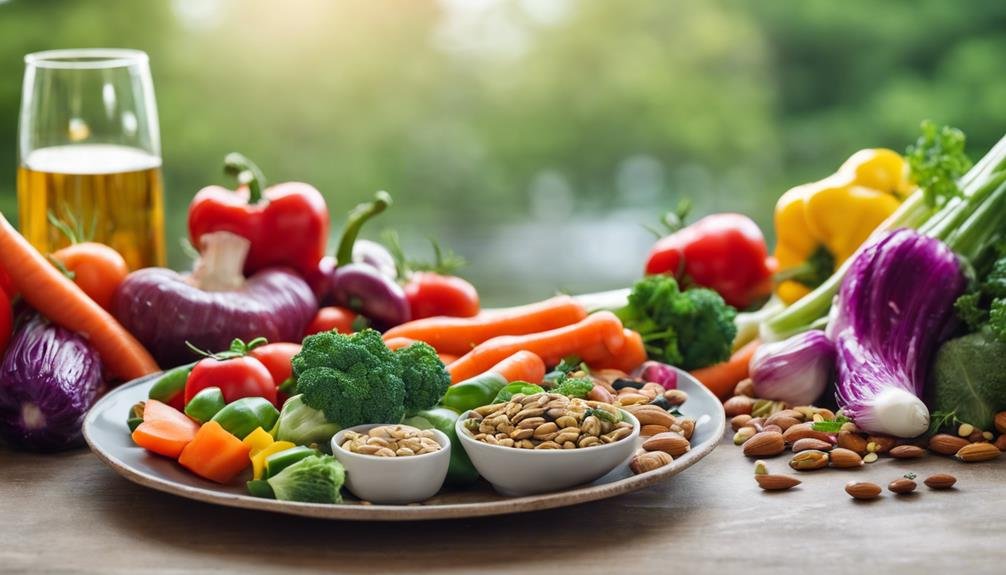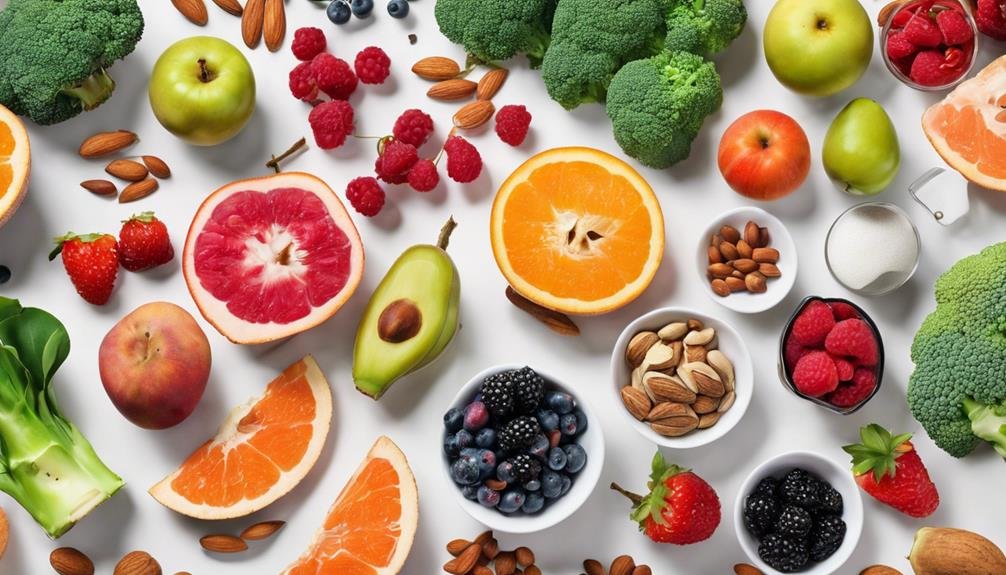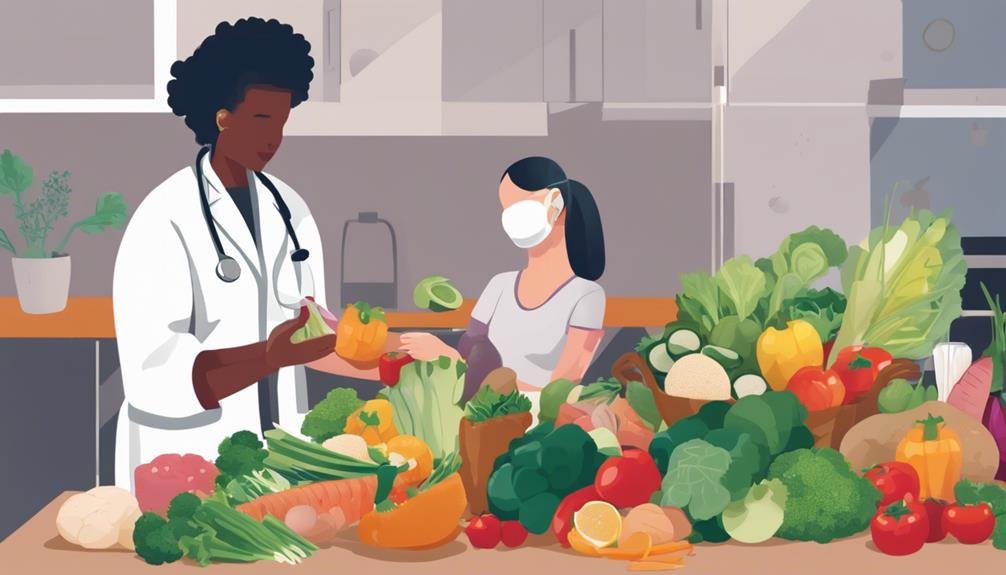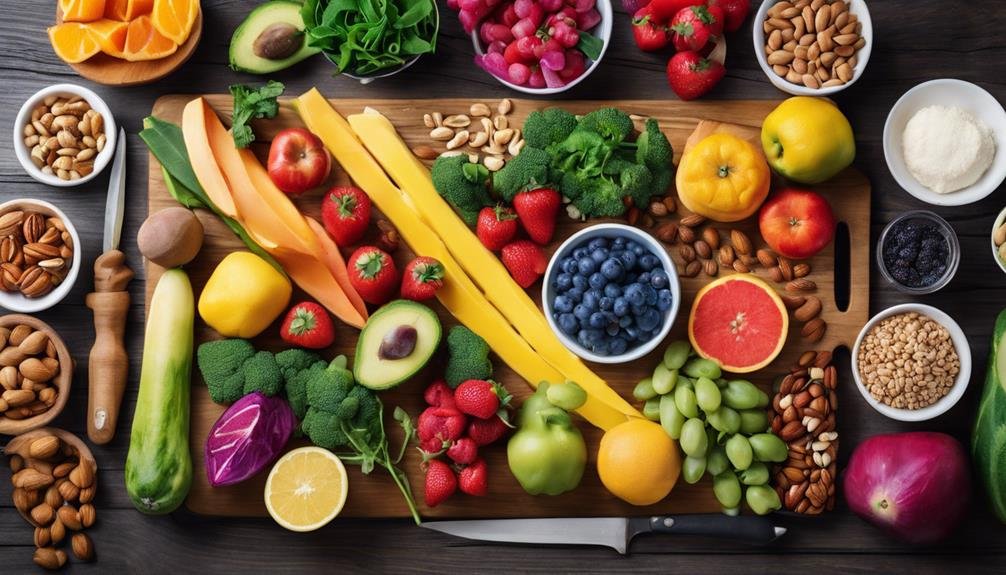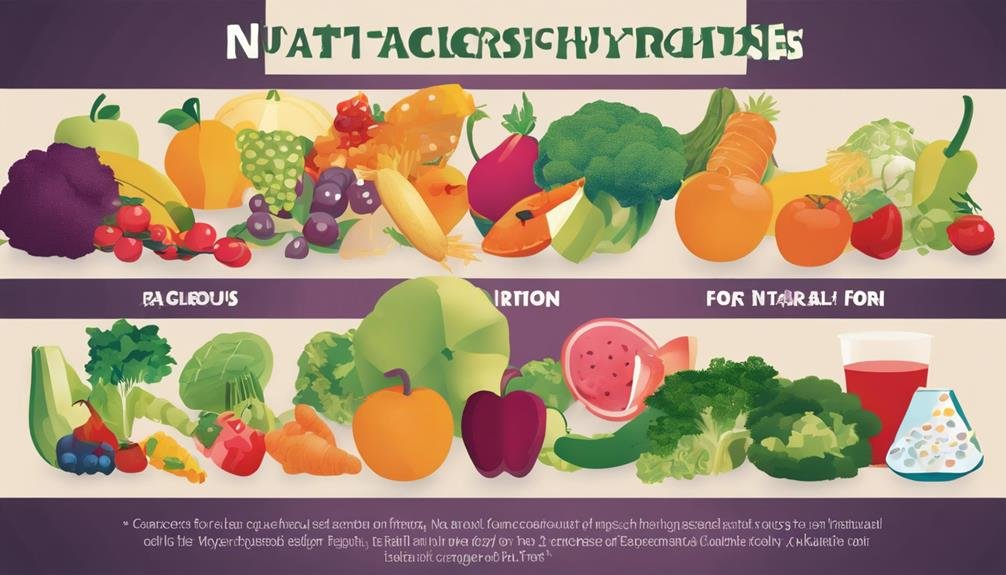When considering how the Paleo diet can be integrated with cancer treatments, you may find yourself intrigued by the potential synergy between nutrient-dense foods and the body's response to therapy. By exploring the impact of this dietary approach on inflammation levels and overall immune function, a deeper understanding of how food choices can influence treatment outcomes emerges. This connection between diet and cancer care offers a compelling perspective on personalized approaches to health management, raising questions about the broader implications of dietary interventions in oncology.
Benefits of the Paleo Diet
When considering the benefits of the Paleo diet in relation to cancer treatments, it's important to recognize the potential impact of this dietary approach on your overall health and well-being. The Paleo diet emphasizes whole foods, lean proteins, fruits, vegetables, nuts, and seeds while excluding processed foods, grains, dairy, and sugars. This approach provides essential nutrients that support your immune system, promote healthy cell function, and reduce inflammation in the body. By incorporating more anti-inflammatory foods like berries, leafy greens, and fatty fish into your diet, you can potentially create an environment in your body that's less conducive to cancer growth and progression.
Moreover, the Paleo diet encourages a balanced intake of macronutrients, including protein, healthy fats, and complex carbohydrates, which can help support your energy levels and overall vitality during cancer treatments. Maintaining a well-nourished body is essential for managing the side effects of treatments like chemotherapy and radiation therapy.
Understanding Cancer Treatments
As you navigate your journey through cancer, understanding the various treatments available is crucial. Cancer treatments aim to target and eliminate cancer cells from your body.
The main types of cancer treatments include:
- Surgery
- Chemotherapy
- Radiation therapy
- Immunotherapy
- Targeted therapy
- Hormone therapy
- Stem cell transplant
Each treatment option has its own benefits and potential side effects, and your healthcare team will work with you to determine the best approach for your specific type and stage of cancer.
Surgery involves removing the tumor and surrounding tissue, while chemotherapy uses drugs to kill cancer cells throughout the body. Radiation therapy targets cancer cells with high-energy beams, and immunotherapy boosts your body's natural defenses to fight cancer.
Targeted therapy focuses on specific molecules involved in cancer growth, hormone therapy alters hormone levels to slow cancer growth, and stem cell transplant replaces damaged bone marrow with healthy cells.
Inflammation and Cancer Connection
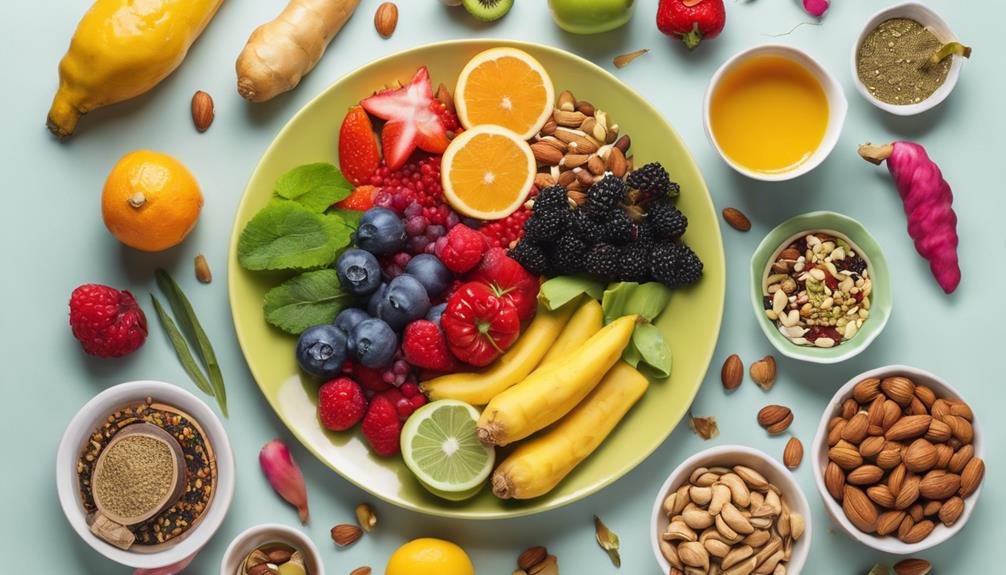
Exploring the intricate relationship between inflammation and cancer reveals a compelling connection that underscores the importance of addressing inflammation in cancer prevention and treatment. Chronic inflammation can play a significant role in the development and progression of various types of cancer. When inflammation persists over time, it can lead to DNA damage, cell mutations, and the promotion of tumor growth. By managing inflammation, you can potentially reduce the risk of cancer and improve the effectiveness of cancer treatments.
Inflammation is the body's natural response to injury or infection. However, when inflammation becomes chronic due to factors like poor diet, obesity, smoking, or chronic stress, it can create an environment conducive to cancer development. Adopting an anti-inflammatory approach through dietary and lifestyle changes, such as following a Paleo diet rich in whole foods and antioxidants, can help combat inflammation and support your body's natural defense mechanisms against cancer.
Understanding the link between inflammation and cancer empowers you to take proactive steps in your health journey. By prioritizing inflammation management through a Paleo-based approach, you're actively supporting your body in the fight against cancer.
Nutrient-Dense Foods for Support
Addressing inflammation and supporting your body's natural defenses against cancer involves incorporating nutrient-dense foods into your diet. Nutrient-dense foods are packed with vitamins, minerals, and antioxidants that can help bolster your immune system and aid in the fight against cancer.
Including a variety of colorful fruits and vegetables in your meals is essential. Berries, leafy greens, and cruciferous vegetables like broccoli and cauliflower are rich in antioxidants and phytochemicals, which can help reduce inflammation and protect your cells from damage.
Healthy fats from sources like avocados, nuts, and olive oil can provide anti-inflammatory benefits and support overall health.
Lean proteins such as wild-caught fish, free-range poultry, and grass-fed beef offer important amino acids and nutrients that your body needs for repair and maintenance. Additionally, incorporating whole grains like quinoa and brown rice can provide fiber and essential nutrients to keep your body strong during cancer treatments.
Managing Side Effects
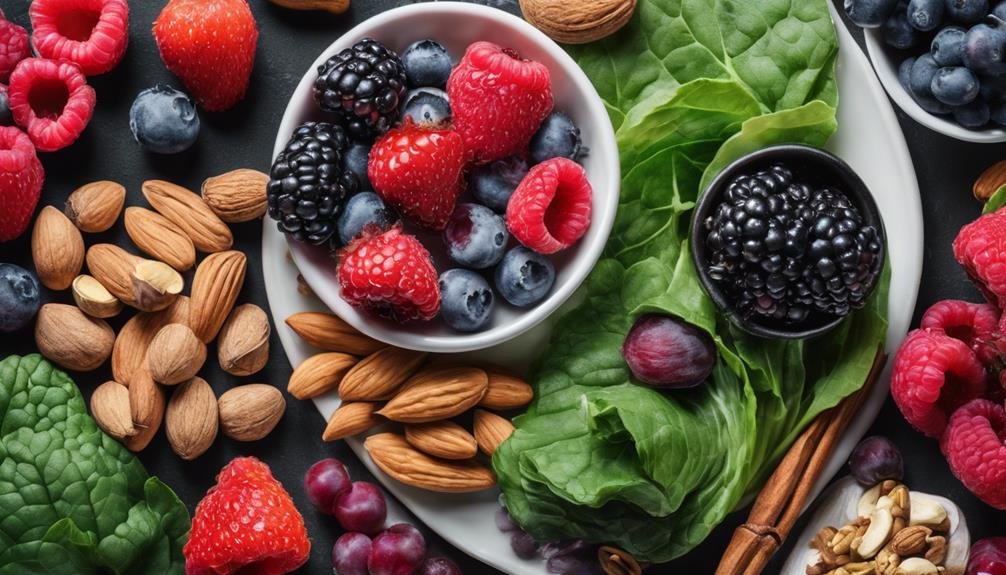
To effectively manage the side effects of cancer treatments, focus on incorporating specific foods and strategies that can help alleviate discomfort and support your overall well-being.
Opt for easily digestible foods like bone broth, ginger, and smoothies to combat nausea and maintain hydration.
Incorporate anti-inflammatory foods such as turmeric, berries, and leafy greens to reduce inflammation and promote healing.
Stay hydrated by drinking plenty of water and herbal teas to flush out toxins and support your body's natural detoxification processes.
Prioritize adequate rest and relaxation to help your body recover and recharge during this challenging time.
Engage in light physical activities like gentle walks or yoga to maintain mobility and boost your mood.
Remember to consult with your healthcare team before making any significant changes to your diet or lifestyle to ensure compatibility with your treatment plan.
Potential Interactions With Treatments
Understanding potential interactions between the Paleo diet and your cancer treatments is crucial for ensuring your health and well-being throughout your journey. It's essential to communicate openly with your healthcare team about any dietary changes you're considering, as certain components of the Paleo diet may interact with specific treatments.
For example, high consumption of cruciferous vegetables in the Paleo diet, such as broccoli and cabbage, could interfere with certain chemotherapy drugs. Additionally, the high protein intake in the Paleo diet may impact how your body metabolizes medications.
It's important to work closely with your healthcare provider to monitor your progress and make any necessary adjustments to your diet to prevent any negative interactions. Remember, your health is the top priority, and collaborating with your medical team will help ensure that your treatment plan and diet are aligned for your best possible outcome.
Importance of Hydration
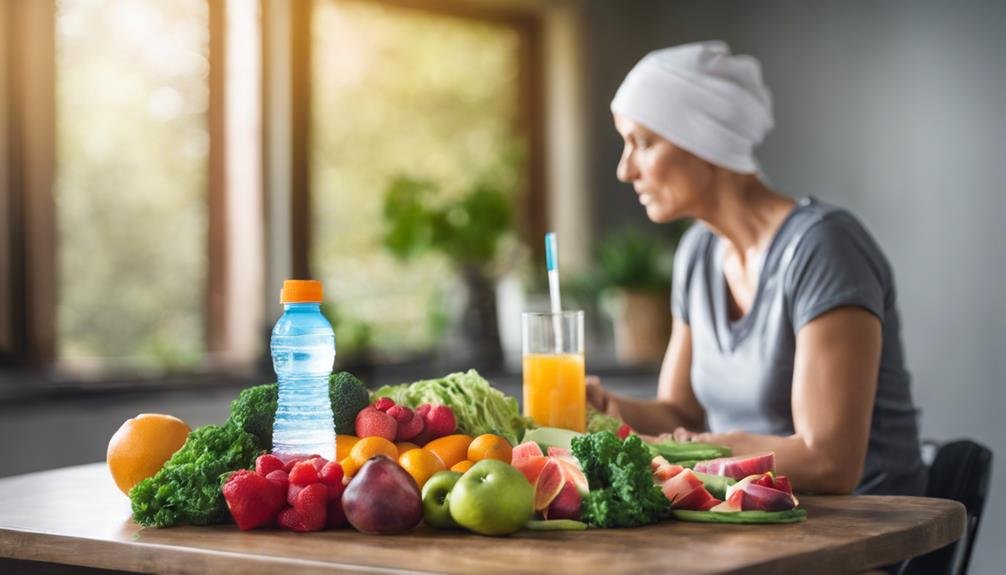
Ensuring proper hydration is vital for maintaining your overall health, especially when undergoing cancer treatments. Hydration plays a crucial role in supporting your body's functions, aiding in digestion, circulation, and overall well-being.
During cancer treatments, staying hydrated can help alleviate side effects like fatigue, nausea, and constipation, while also promoting the elimination of toxins from your body.
Dehydration can exacerbate the side effects of treatments and hinder your body's ability to heal and recover. It's recommended to drink plenty of water throughout the day, aiming for at least 8-10 glasses to ensure adequate hydration. Herbal teas and coconut water can also contribute to your fluid intake while providing additional health benefits.
If you find it challenging to drink enough fluids, try keeping a water bottle with you at all times, setting reminders on your phone, or infusing water with fruits for added flavor. Remember, every sip you take is a step towards supporting your body in its fight against cancer and promoting overall wellness.
Incorporating Antioxidants
Among the key components to consider when integrating the Paleo diet with cancer treatments is the incorporation of antioxidants. Antioxidants play a crucial role in protecting your cells from damage caused by free radicals, potentially reducing inflammation and supporting your overall health during cancer treatments. By including antioxidant-rich foods like berries, dark leafy greens, nuts, and seeds in your Paleo meals, you can help your body combat oxidative stress and strengthen your immune system.
Research suggests that antioxidants may aid in minimizing the side effects of certain cancer treatments, such as chemotherapy and radiation therapy, by protecting healthy cells from damage. Additionally, antioxidants have been linked to potentially reducing the risk of cancer development and recurrence.
While more studies are needed to fully understand the impact of antioxidants on cancer treatment outcomes, incorporating these powerful nutrients into your diet can be a proactive step in supporting your overall well-being. Remember to consult with your healthcare team to ensure that your dietary choices align with your treatment plan.
Balancing Macronutrients
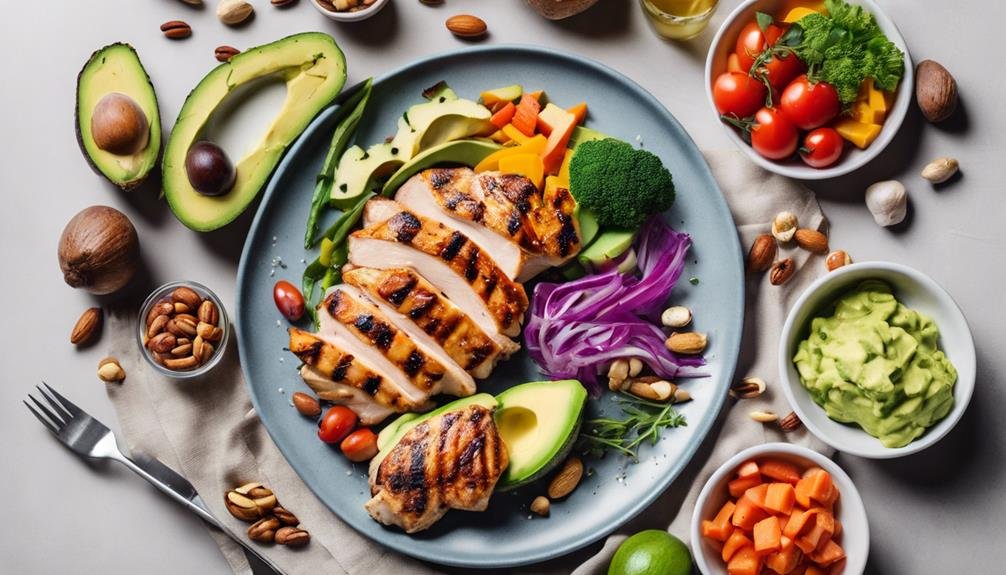
As you navigate the integration of the Paleo diet with cancer treatments, another key aspect to consider is balancing macronutrients. Balancing macronutrients, which include carbohydrates, proteins, and fats, is essential for overall health and well-being during cancer treatment. Ensuring you have a good balance of these nutrients can help support your immune system, maintain muscle mass, and provide the energy your body needs to fight the disease.
When following the Paleo diet, it's important to focus on obtaining healthy sources of each macronutrient. For carbohydrates, opt for nutrient-dense choices like fruits, vegetables, and sweet potatoes.
Lean proteins such as grass-fed meats, poultry, and fish are crucial for muscle maintenance and repair.
Healthy fats from sources like avocados, nuts, and olive oil can provide essential fatty acids and support overall health.
Meal Planning Strategies
To effectively integrate the Paleo diet with cancer treatments, implementing thoughtful meal planning strategies is crucial. Planning your meals carefully can help ensure you're getting the necessary nutrients to support your body during treatment. Start by focusing on whole foods such as lean proteins, fruits, vegetables, nuts, and seeds. These foods provide essential vitamins, minerals, and antioxidants that can aid in your recovery process. Aim to include a variety of colors on your plate to maximize the nutritional benefits.
Consider meal prepping in advance to make healthier choices easier during busy days. This can help you avoid reaching for processed or unhealthy foods when you're short on time or energy.
Additionally, staying hydrated is key to supporting your body through treatment. Make sure to drink plenty of water throughout the day and consider incorporating herbal teas or coconut water for added hydration and electrolytes.
Consulting With Healthcare Providers

When navigating the integration of the Paleo diet with cancer treatments, a key aspect to prioritize is consulting with your healthcare providers. Your healthcare team plays a crucial role in helping you make informed decisions about your diet during cancer treatment. They can provide personalized guidance based on your specific health condition, treatment plan, and individual needs.
By discussing your interest in following the Paleo diet with them, you can ensure that it aligns with your overall treatment goals and doesn't interfere with any medications or therapies.
Healthcare providers can offer valuable insights into how the Paleo diet may impact your nutritional needs, energy levels, and overall well-being during cancer treatment. They can also monitor your progress, address any concerns that may arise, and make necessary adjustments to support your health and recovery journey.
Open communication with your healthcare team is essential for creating a holistic approach that combines the benefits of the Paleo diet with your cancer treatment plan.
Tracking Progress and Adjustments
Ensuring effective tracking of your progress and making necessary adjustments are integral components of successfully integrating the Paleo diet with cancer treatments. Keeping a detailed record of your dietary choices, energy levels, symptoms, and overall well-being can provide valuable insights into how your body is responding to the diet changes. By consistently monitoring your progress, you can identify trends, triggers, and areas that may need modification to optimize your health during cancer treatment.
Regularly consulting with your healthcare team to discuss your progress and any challenges you may be facing is crucial. They can offer guidance, support, and adjustments to your diet plan based on your individual needs and treatment protocol. Be open and honest about how you're feeling and any concerns you may have, as this information is essential for making informed decisions about your dietary choices.
Remember that every individual responds differently to dietary changes, especially during cancer treatments. Stay patient, stay committed, and trust the process as you navigate this journey towards better health and well-being.
Together with your healthcare providers, you can tailor the Paleo diet to support your overall treatment plan and enhance your quality of life.
Frequently Asked Questions
Can the Paleo Diet Prevent Cancer Recurrence?
Absolutely, the Paleo diet's focus on whole foods, lean proteins, and healthy fats can potentially reduce cancer recurrence risk. Research suggests that this diet may help in maintaining a healthy weight, reducing inflammation, and enhancing overall well-being, all of which are important factors in preventing cancer from returning.
It's essential to consult with healthcare professionals to personalize your diet plan and ensure it complements your cancer treatment and recovery journey.
Is It Safe to Follow the Paleo Diet During Chemotherapy?
Like a gentle breeze guiding you through a storm, following the Paleo diet during chemotherapy can be safe with proper guidance.
It's crucial to consult your healthcare team to ensure nutritional needs are met.
The focus on whole foods and lean proteins in the Paleo diet can support your body's overall health during treatment.
How Can the Paleo Diet Support Immune Function During Cancer Treatment?
To support immune function during cancer treatment, the Paleo diet emphasizes whole foods rich in nutrients that can aid your body's defense mechanisms. Incorporating lean proteins, healthy fats, and an abundance of fruits and vegetables can provide essential vitamins and minerals. By reducing processed foods and sugars, you may help reduce inflammation and support your immune system's ability to function optimally during this challenging time.
Are There Specific Paleo Foods to Avoid During Radiation Therapy?
Hey, when going through radiation therapy, consider avoiding processed meats like bacon and deli meats due to their potential link to cancer risk. Opt for fresh, lean proteins like salmon or chicken instead.
Also, try limiting your intake of sugary treats and refined grains, as these can spike blood sugar levels.
Sticking to whole, nutrient-dense foods on the Paleo diet can help support your overall health during this challenging time.
Can the Paleo Diet Reduce Chemotherapy-Induced Fatigue?
Yes, the Paleo diet can help reduce chemotherapy-induced fatigue. By focusing on whole, unprocessed foods like lean proteins, fruits, and vegetables, you provide your body with essential nutrients to combat fatigue. Avoiding processed sugars and grains can also stabilize your energy levels.
Remember to consult with your healthcare provider to ensure your diet complements your treatment plan effectively. Stay nourished and hydrated to support your body during this challenging time.
Conclusion
As you journey through cancer treatments, integrating the Paleo diet can be like adding vibrant colors to a painting – enhancing your body's ability to fight, heal, and thrive. By focusing on nutrient-dense foods, managing side effects, and consulting with your healthcare team, you are creating a strong foundation for your well-being. Remember, you are not alone in this journey, and every small step towards a healthier diet can make a big difference in your fight against cancer.
